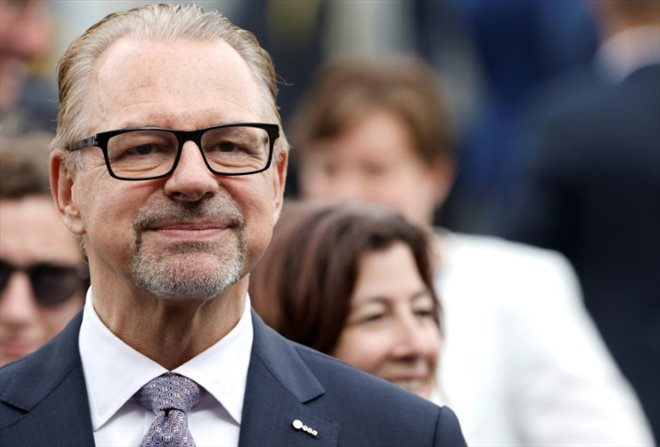The central stage of Ariane 6 on a launch pad at the Kourou space base for tests, July 11, 2022 (ESA-CNES-Arianespace/Optique/AFP/E PRIGENT, P BAUDON)
The discussions are arduous and must decide the space future of Europe: European ministers are meeting Monday and Tuesday in Seville to define the means of perpetuating the launchers and the role of the continent in space exploration.
Faced with the rush of Americans, Indians and Chinese towards the Moon, the growing economic role of space data and a crisis depriving it of autonomous access to space, Europe must decide.
“The stakes are high and my question is literally: where does Europe want to go?” calls out the head of the European Space Agency (ESA) Joseph Aschbacher.
Does she want to position herself as a simple customer of services sold by others or does she consider space as a strategic issue, he asks.
The first day of this space summit will be devoted to a ministerial council of the 22 ESA member states (most EU countries, the United Kingdom, Switzerland and Norway). The second, organized by the Spanish Presidency of the European Union, is dedicated to a joint EU-ESA meeting.
During this summit, States must reiterate their commitment to making Earth observation for climate a priority for future investments. The subject is little debated, according to several sources who say they are optimistic.
Another item on the agenda: robotic and manned exploration. In a report commissioned by the ESA, experts called in April on Europe to guarantee a “permanent and independent presence” in terrestrial and lunar orbits, as well as on the Moon.
Europe currently does not have its own means to send astronauts into space, depending on a barter system used until now with Moscow or Washington.
This requires significant investments, but “we are not in a promising economic situation”, points out Joseph Aschbacher.
– “System failure” –

(POOL/AFP/Ludovic MARIN)
A “first step” would be, according to a source close to the matter, for the industry itself to initially develop a cargo capsule for missions in low orbit. States would offer guarantees of purchases of services in return. “It’s a way to reduce costs,” said this source.
The most thorny point concerns the question of space launchers, a condition for autonomous access to space. “The discussions are difficult,” concedes Philippe Baptiste, president of Cnes, the French space agency.
States must find an operating model for Ariane 6, which will have to be subsidized to ensure competitiveness against the American SpaceX in particular. The four-year delay for the rocket, which will not make its maiden flight until 2024, and inflation have generated “considerable additional costs”, according to a source close to the matter.
When the program is at cruising speed, that is to say from the 16th flight by 2027-2028, there will be a financing need of around 350 million euros per year, according to her, confirming information from La Tribune.
France, which finances half of the program, is doing so in the name of sovereignty, as is Italy, in a similar situation with its Vega-C launcher. But for Germany and most countries, it is a “failure of the system”, explains this source.
Berlin, for its part, wants more competition for the next generation of European launchers, in order to reduce costs.
Rather than an ESA-led program, the agency would purchase launch services from industry, similar to the approach taken by NASA. Several German companies are preparing for this by currently developing small launchers, as is the French company MaiaSpace, a subsidiary of Arianegroup, the manufacturer of Ariane 6.
Rome is pushing for Avio, the Italian manufacturer of Vega-C, to be able to directly market its rocket, currently operated by Arianespace on behalf of the ESA.
Faced with this major potential upheaval, the other ESA states will also have their say, with decisions being taken by consensus. States benefit from the geographical return rule, providing that each country’s investment results in equivalent industrial benefits for its companies.
“If we find an agreement, it is a complete reset around the launcher system, that means that we secure the existing one, Ariane 6, that we agree on a method to prepare the future and that we are preparing the Kourou space base”, estimates Philippe Baptiste, for whom “there is a form of exasperation, so it is now, we have to find an agreement”.
© 2023 AFP
Did you like this article ? Share it with your friends using the buttons below.




